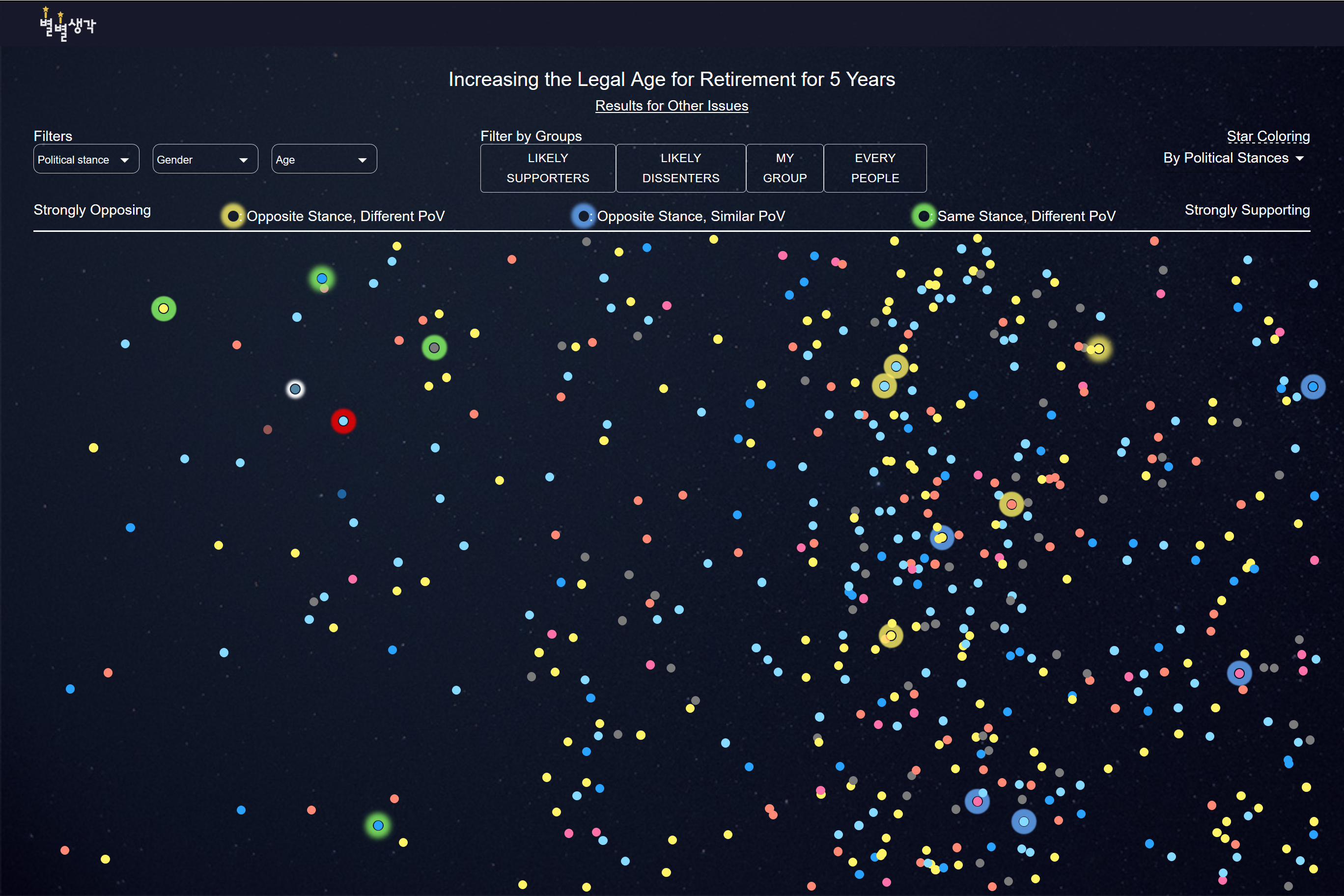 StarryThoughts
StarryThoughts
Enabling the free and equal exchange of arguments on social issues in a respectful manner is an integral part of establishing the democratic ideal. However, the current manifestation of online spaces tends to facilitate the gathering of like-minded people, leading to the polarization of opinions. Such polarization inhibits the sharing of diverse opinions and deteriorates respect for disagreeing opinions. To tackle this issue, we present StarryThoughts, an online system that supports users to express and explore diverse perspectives on social issues. The system supports three types of exploration of the collected arguments online: navigating opinions based on the demographic identities of the posters, checking the the stereotypes users hold towards demographics in relation to given social issues, and engaging with opinions with semantically different point-of-views. By deploying the system to the public in co-operation with a nationwide broadcasting company, we collected 1,950 opinions with 144 free-form responses from 1,209 visitors as initial data and iterated on the design. Results from a user study with 56 participants showed that the system enables participants to explore a wide range of opinions on social issues, be more informed on the various arguments, and be more confident about their opinions. From our findings, we provide several design considerations for building online systems for supporting users to explore diverse opinions on social issues.

Live version of the interface is available. (In Korean)
StarryThoughts aims to present the diversity of opinions as well as the contexts behind the opinions. To do so, StarryThoughts visualizes the opinions as dots on a 2-D space, with the metaphor of “Starry Night Sky of Opinions”. The user can explore opinions by clicking and hovering each dot. Following are some of the main design decisions for the system:
In the system, each opinion is presented as a dot. The user can click or hover on each dot to read the opinions in detail. The dots are colored by the demographic identities of the authors.
The dots are horizontally positioned by their position on the issue. By doing so, we wanted to present the distribution of the opinions in a visually salient manner. On the other hand, the vertical positions of the dots are chosen randomly.
From the pilot studies, we discovered that one of the most common usage scenarios of the system was to discover the trend of opinions according to the demographic factors. Users often had a set of specific demographic group that they were interested, such as expected supporters or dissenters of an issue.
To support users understanding the opinions of each demographic group, we included a filtering feature to select opinions by the demographics of the authors. Furthermore, to leverage users’ prior expectations for engaging the users, we included a step for explicitly stating their prior expectations on the opinion distribution by demographics in the system. The user could verify their expectations by filtering the opinions from the expected supporter or dissenter groups.
From the pilot studies, we learned that the participants felt overwhelmed from seeing a large number of opinions at once and relied on the recommendation feature. To guide users exploring the diversity of opinions, we designed a recommendation algorithm for suggesting opinions different from the one currently being read. Recommended opinions glow in different colors to be easily noticed. Recommendation works by computing the document embedding of each opinion and retrieving the opinions with the least similar document embedding.
With 56 participants, we conducted a in-lab user study to understand a) how the users used StarryThoughts, b) how using StarryThoughts affected users’ opinions, and c) how using StarryThoughts affected users’ attitude towards other opinions.
From the usage logs of the participants, the most prevalent pattern was using the filters to observe how different demographic groups had differetn opinion distribution. If the participant could discover some notable patterns of opinion distribution, they started exploring the opinions in detail. On the other hand, if the participant could not find a visible trend of opinions, they felt less interesting with the exploration or even feel puzzled to find the starting point of opinion exploration.
Comparision of participants’ opinions between before and after study showed that their opinion shifted towards more moderate. At the same time, participants’ confidence on their opinion has increased. Analysis of participants’ responses show some common themes behind such changes.
“I saw an opinion from a person suffered from game addiction, saying that external help was essential. Also, I agreed with the opinion that mentioned classifying game addiction as a disorder would help the actual game addicts to get good care.” (P27)
“I was surprised to see that people were supportive of the regulation on gaming with such shallow opinions. (…) I could not agree with their opinion on how the social regulations or laws should be made.” (Q4)
“I thought I was in a minor group, so I expected few people would share my opinion. (After using the system) I felt my opinion was reasonable than I expected.” (P25)
“(…) I found one questioning the specific criteria to define game addiction. I agreed to that opinion a lot, and I became more confident in my opinion.” (P31)
Analysis of participant’s responses present how demographic identities affected the participants to have more respectful attitude to opinions.
“ (…) I could acknowledge and resolve my misunderstanding towards social groups that I don’t belong to and people do not share the same opinion with me.” (Q1)
“Compared to online news comments, which present nothing about who wrote such comments, the demographic identities made the opinions more credible.” (Q4)
“I read a supportive opinion for Game Addiction issue, and I saw that the author is a woman in her 40s. I could understand why she ended up having such an opinion. Still, it’s separate from whether I agree with her or not.” (Q4)
@article{10.1145/3449140,
author = {Kim, Hyunwoo and Kim, Haesoo and Jo, Kyung Je and Kim, Juho},
title = {StarryThoughts: Facilitating Diverse Opinion Exploration on Social Issues},
year = {2021},
issue_date = {April 2021},
publisher = {Association for Computing Machinery},
address = {New York, NY, USA},
volume = {5},
number = {CSCW1},
url = {https://doi.org/10.1145/3449140},
doi = {10.1145/3449140},
journal = {Proc. ACM Hum.-Comput. Interact.},
month = apr,
articleno = {66},
numpages = {29},
keywords = {polarization, public sphere, opinion exploration, identities}
}
This work was commissioned to be presented at the SBS D Forum 2019 with support from the SBS Future and Vision Team.